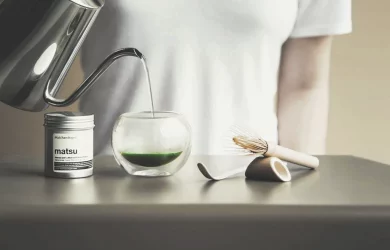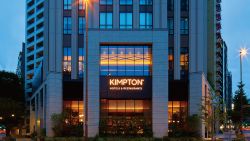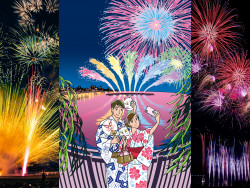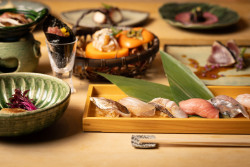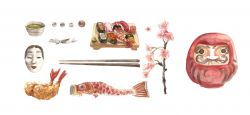
May 27, 2010
Katsu Tanaka
Good coffee? At Bear Pond Espresso, it’s a matter of destiny
By Metropolis
Originally published on metropolis.co.jp on May 2010

Photos by James Hadfield
“Espresso hits the brain the same way as cocaine,” says Katsuyuki “Katsu” Tanaka, cradling his latest creation. There’s a shallow, chocolatey trickle of liquid at the bottom of the cup, barely an ounce. The sides are flecked with drips of coffee—what Katsu calls the “angel stain,” the result of him whipping it in and out from under the nozzle of the espresso machine mid-stream. “We say it’s a sign that came from God,” he explains.
Such is the caffeinated voodoo practiced at Bear Pond Espresso in Shimokitazawa. Since opening in April last year, the shop has gained a strong and slavishly dedicated following. The author of the Tokyo Espresso blog called it quits after going there, declaring that “the search for transcendent espresso in Tokyo is over.” and it’s been featured in publications including Condé Nast Traveler and the Asahi Shimbun.
Katsu runs Bear Pond with his wife Chisa out of a former candy store, painted white and minimally decorated. A stream of ’60s and ’70s rock plays in the background, and on warm days he keeps the windows and door open so that he can chat to friends as they pass by. If you want to try one of his espressos, you’ll need to turn up before 2pm: Katsu won’t make them after that, as the shop gets too crowded to do it properly. When I visit immediately after a national holiday, he admits that he pulled 300 shots the previous day. And he relishes every one.
“When a customer comes in, each time it’s different,” he says. “The streaming techniques are different—not the same as yesterday, [or] the previous shot. Every shot is different.”
Katsu has his beans roasted to order and keeps 20 kilos stored on-site. He fills a book with notes on the condition of each batch, which he consults every morning to determine what to use that day. The “sweet spot” for espresso, apparently, is between five and ten days after roasting, and variations in temperature and pressure while pulling a shot create further differences in flavor.
“This means destiny: faith and destiny,” he says. “The faith is the bean. After, the espresso is the destiny. Because a barista can change a bean’s destiny.”

Katsu’s own quest to barista buddhahood began during an 18-year stint in New York City, where he worked first for an advertising agency and later as a worldwide account manager for FedEx. The Big Apple never used to have a reputation for sophisticated coffee, but over the past decade it’s seen an explosion in specialty shops that take their art very seriously indeed. When Ninth Street Espresso and Gimme! Coffee opened in his neighborhood, Katsu became a regular.
“I went there every morning, afternoon and evening,” he says, admitting that he’d never had a taste for the stuff in Japan. “And finally, I got it: I had a good palate.” He also took advantage of the education programs run by this new breed of artisanal coffee shop, attending public cuppings—the equivalent of wine tastings—organized by North Carolina’s Counter Culture Coffee.
“After that, it was drink, drink, cupping, drink, cupping, drink,” he recalls.
When he went to a seminar held by Joe The Art of Cupping, Katsu’s sensitivity to differences between coffees caught the attention of a writer from the New York Times, who praised his “sophisticated palate.”
“After that, everybody contacted me. ‘Hey, Katsu! You’re so clever. What’s going on?’” Counter Culture recommended more training, so he enrolled in their barista certification course, covering “the history of espresso, cupping, origin, variety—everything.” He also attended hands-on Lab sessions held by Gimme! Coffee, which focused more on the practical art of preparing coffee and milk at the counter.
All in all, Katsu reckons it’s taken him ten years to get to where he is now. “Many Japanese go to the United States, and research there one week, and then go back to Japan,” he says. “It’s impossible. You need more time to develop… Some people say, ‘Oh, [they] went to New York, and tasted Gimme! and blah, blah, blah.’ Just one time. That’s nothing.”
“A barista has to understand each variety, where it came from, everything, and understand how to change it,” he continues. “The most important [thing] is passion. Continuing the passion, believing in yourself, is most important. But most people are only focused for a couple of years: lots of education, but after that, no passion.”
These days, Katsu doesn’t pay attention to what the competition is doing. “I don’t have to drink at another location, because I have to research my drink,” he says. “I’m not gonna compare. I love uniqueness. I don’t care about ‘best’: the most important is uniqueness.
“My friends go to Starbucks. Starbucks is very popular. But good taste?”
He frowns, and leaves it at that.
Bear Pond Espresso, 2-36-12 Kitazawa, Setagaya-ku. Tel: 03-5454-2486. Open Wed-Mon 9am-6:30pm, closed Tue. Nearest stn: Shimokitazawa, north exit. www.bear-pond.com
